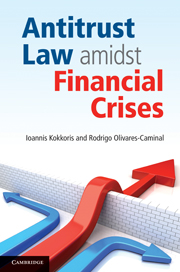Book contents
- Frontmatter
- Contents
- Foreword by Philip Lowe
- Foreword by Frederic Jenny
- Preface
- Table of cases
- Table of treaties and other international instruments
- Introduction
- 1 Introduction to competition law: EU, US and UK
- 2 Some notes on crises
- 3 Failing-firm defence
- 4 Efficiencies
- 5 Crisis cartels
- 6 State aid (Phedon Nicolaides)
- 7 Competition enforcement in periods of crisis
- 8 Conclusion
- Index
Foreword by Frederic Jenny
- Frontmatter
- Contents
- Foreword by Philip Lowe
- Foreword by Frederic Jenny
- Preface
- Table of cases
- Table of treaties and other international instruments
- Introduction
- 1 Introduction to competition law: EU, US and UK
- 2 Some notes on crises
- 3 Failing-firm defence
- 4 Efficiencies
- 5 Crisis cartels
- 6 State aid (Phedon Nicolaides)
- 7 Competition enforcement in periods of crisis
- 8 Conclusion
- Index
Summary
The financial crisis has had a considerable impact on competition policy and competition law enforcement.
First, questions were raised about the trust that one could put in free and competitive markets. It was recognized that for markets, such as the financial markets which have a systemic risk component, strict prudential regulation is a necessary complement of competition. Inadequate regulation or regulation which did not keep up with innovation in the financial markets was considered to be at the heart of the financial crisis. The political rhetoric of the 1990s against regulation was replaced by a more pragmatic approach to regulation.
Second, questions arose about whether and how competition law enforcement should be modified in a time of financial and economic crisis.
A consensus had emerged toward the end of the twentieth century that the enforcement of competition law should move toward an ‘effects-based approach’. This approach requires that the competitive and efficiency effects of business practices or transactions be analysed in the context in which they are implemented to determine whether they should be prohibited.
This move away from an ideological or formalistic approach to competition law enforcement and towards a method of enforcement based on applied economic analysis put competition authorities in a much better position to face the challenges of the economic and financial crisis.
- Type
- Chapter
- Information
- Antitrust Law amidst Financial Crises , pp. xii - xiiiPublisher: Cambridge University PressPrint publication year: 2010



